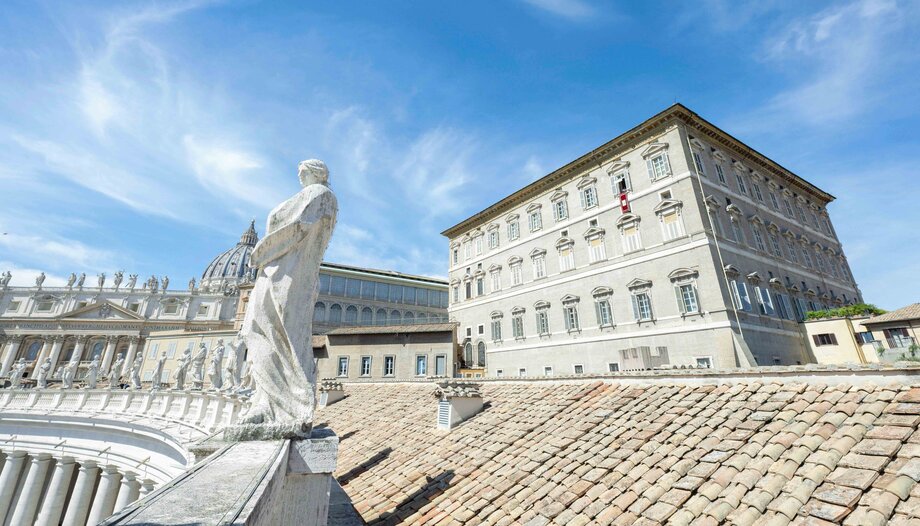The Second Session of the XVI Ordinary General Assembly of the Synod of Bishops opens on October 2. At its conclusion, on October 27, the phase of discernment by the pastors will conclude and the phase of reception of the conclusions in the whole Church and in each of the local Churches will begin, in the forms and modalities to be indicated by Pope Francis.
The task of the Assembly is to seek answers to the guiding question indicated by Pope Francis, "How to be a synodal Church in mission?", and to indicate concrete ways of putting them into practice, in relation to the themes proposed in the "Instrumentum laboris" for the Second Session (IL2).
IL2 opens with the prophet Isaiah's vision of the messianic banquet (25:6-8), thus clarifying that the horizon of a synodal Church is mission at the service of God's desire that all human beings and all peoples be invited to the banquet of his Kingdom. Without a clear perspective of missionary proclamation, the Synod would run the risk of being only a self-referential exercise.
The text of IL2 is organized in four sections, which correspond to the first four modules of the work of the assembly. By reading its summary one can realize what is at stake in the Second Session and its relevance for the life and mission of the Church.
Fundamentals and relationships
The first section, "Foundations," outlines the theological horizon in which the work must be situated. It is not a treatise on ecclesiology, but touches on points such as the sacramental nature of the Church, the shared sense of synodality, the reciprocity between men and women in the Church, and the dialogue between the Church's differences, which does not compromise its unity, but rather enriches it.
The second section, "Relationships," focuses on the relational fabric of which the Church is composed, indispensable for sustaining persons and communities. The emphasis on relationships responds to the desire for a Church that is less bureaucratic and closer to people, which is associated throughout the world with the terms "synodal" and "synodality." But it is also in line with Christian anthropology.
As Benedict XVI has written, "the human creature, as a spiritual creature by nature, is fulfilled in interpersonal relationships. The more authentically she lives them, the more her personal identity matures" ("Caritas in veritate", n. 43).
Attention to relationships is expressed in concreteness. Thus, the following are addressed: the relationship between charisms and ministries; the ways in which the Church is "perceived as home and family" (IL2, n. 33); the peculiar nature of ordained ministers (bishops, priests and deacons) and their relationship with the rest of the People of God; the exchange of gifts that binds the local Churches together in the one universal communion. The gaze is never turned inward, but remains focused on the mission, since it is precisely the quality of relationships that makes the proclamation of the Gospel credible.
Roads and places
The third section, "Pathways," focuses on the processes of fostering and developing relationships, promoting harmony in the community through the ability to face conflicts and difficulties together.
The issues of formation and discernment are addressed here, as well as a reflection on decision-making processes based on the participation of all and the recognition of differentiated responsibility among the members of the community according to the role of each one, with a view to an inalienable, but not unconditional, decision-making competence of hierarchical authority. Finally, this section addresses the promotion of a culture and concrete forms of transparency, accountability and evaluation of the work of those in positions of responsibility.
Finally, the fourth section, "Places," focuses on the concreteness of the contexts and the variety of cultures in which the Church lives. The latter represents a crucial challenge for a Church that defines itself as Catholic, that is, universal, and wants to be able to welcome everyone without asking anyone to uproot himself or herself from his or her own culture. Here there is room for the Bishop of Rome's service to unity, the most appropriate forms for its exercise in today's world and the search for institutions and structures capable of promoting unity in diversity and diversity in unity.
The Holy Spirit and the Synod Assembly
The outcome of the discernment of the Synodal Assembly cannot be predicted, but some results already achieved can be recognized. Synod 2021-2024 shows that it is possible to imagine participatory paths on a global scale and that people with very different, if not opposing, points of view can meet, dialogue and, above all, be willing to listen together to the Holy Spirit and discern what he is inviting them to.
It is precisely the fact of sharing the same Trinitarian faith that is the cornerstone for mutual acceptance and for the uncompromising articulation of perspectives that may seem quite distant. Thus it was also possible to experiment with an articulation of the global and the local - that is, the universal and the particular - that escaped both homogenization and particularism. This was certainly a first attempt, which will have to be further improved.
A key factor in all this is the method-which has become characteristic of the synodal process-based on conversation in the Spirit. With the necessary adaptations to the different contexts, it proves capable of promoting, in an atmosphere of prayer and readiness for mutual acceptance, a consensus that escapes polarization. These results encourage us to look forward to the Second Session, but even more so the certainty, repeatedly confirmed, that the protagonist of the Synod is the Holy Spirit.
Special Secretary of the XVI Ordinary General Assembly of the Synod of Bishops







